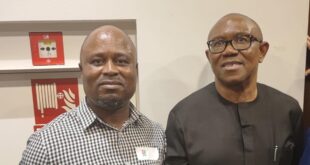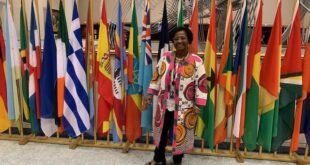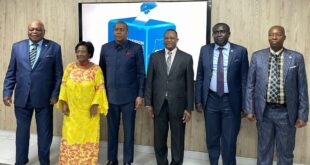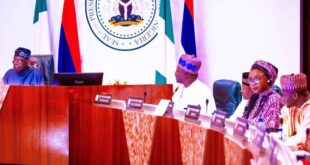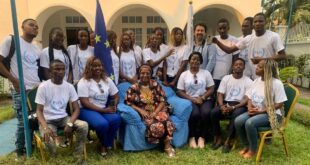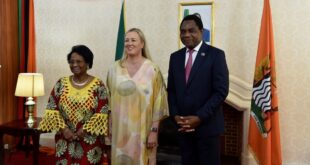The Nigerians in Diaspora Organisation Europe (NIDOE) will hold its annual general meeting on 10-14 November in Rome, Italy. A new central executive committee will also be elected during the gathering.
In an exclusive interview with The African Courier, Dr Bashir Olalekan Obasekola, the Chairman of NIDOE, talks about the organisation, its relevance to Nigerians living abroad and what it has achieved since its founding twenty years ago. The Moscow-based economist, who is seeking re-election in Rome, lists the achievements of the organisation under his charge and he reveals what he has in store if given a second two-year term.
How does it feel to be the representative of all Nigerians living in Europe?
It is indeed a privilege to serve.
What are the challenges you face on the job?
I feel challenged to always aggregate the opinions and feelings of Nigerians across board. Hence my official position must always be such that balances our diversities. I must confess that it is not an easy task. It requires self-discipline and experience.
How relevant is NIDO to Nigerians living in the diaspora?
NIDO is the interface between the Nigerian government and its diaspora. We represent the interest of all Nigerians living abroad in our continent. Therefore, NIDO is relevant to Nigerians living in the diaspora.
It is the platform to galvanise and aggregate all the interests, concerns and aspirations of Nigerians living abroad. We’re like a labour union. Not all workers are financial members, but the union represents the interest of all workers.
Twenty years after its founding, what has NIDO achieved?
After the initial euphoria of its establishment and high expectations of its founding fathers, it has not been quite easy for NIDO. First was the struggle to get total acceptance as the umbrella organisation by the already existing numerous Nigerian associations.
This struggle lingered for quite a while and depleted some of the attention that the organisation required at the nurturing stage. Even amongst its principal officers, there were some serious differences.
Though we were a bit lucky in Europe, but in other continents like in the Americas, the differences were quite consequential and some even went as far as involving law courts.
So, these initial troubles did not allow NIDO to be fast and steady in achieving all what it had been set up to achieve.
So, you have been dealing with these challenges all these twenty years?
No! Not only that. NIDO has nevertheless maintained its core vision to develop effective, unified platform for Nigerians in diaspora to harness their talents, expertise and resources for Nigeria’s national development and nation building.
Well, that sounds lofty. The question many in the diaspora always pose is, what are the concrete achievements of NIDO?
We are proud that many diasporans developed their interests in Nigeria because of the network and advocacy of NIDO. Thanks to the persistent and pressure from NIDO, the Nigerian government established an agency to take care of all issues concerning diaspora Nigerians, the Nigerians in Diaspora Commission (NiDCOM).
Illustrious members of the Nigerian diaspora, such as Dr Ngozi Okonjo-Iweala, Dr Segun Aganga and Dr Akinwunmi Adesina, have served our land meritoriously. Currently, there are many diaspora returnees in government, from federal to local levels, and in private businesses, contributing to the economic and social development of Nigeria.
All these are also direct and indirect achievements of the existence of the diaspora engagement, in which NIDO is a critical link.
NIDO’s relationship with NiDCOM was a big issue when you assumed the leadership of the organisation two years ago. What has been the relationship like since then?
Yes, NiDCOM remains very relevant to us. Not only because NIDOE was one of the vanguards that pushed for the establishment of the Commission, but also because we were also expected to be represented on the Board of the Commission.
The previous administration under Hon Kenneth Gbandi tried all it could to pressurise the Federal Government to constitute the NiDCOM Governing Board. Many letters were written to the President and Hon Abike Dabiri-Erewa [the Chairman/CEO of NiDCOM] and publications by NIDO-Worldwide; unfortunately, they yielded no positive results. Instead, the issue led to public personal attacks and exchanges; creating unconducive atmosphere for NIDO operations. Many good initiatives and projects of NIDOE suffered set-backs because of this confrontation.
Hence, when we came on board in November 2020, we set up an Ad-Hoc Committee to advise us on how best to approach this issue. We eventually, decided to divide our relationship with NiDCOM into two parts: operational and statutory (as per the NiDCOM Act).
We decided that for the sake of the organisation and its members, we would work with NiDCOM on our operational issues as partners-in-progress, while using every opportunity that such operational interactions offer to press for the implementation of the NiDCOM Act on the formation of the Governing Board.
We, the Board of NIDOE (including the 23 chapters) held an official meeting with Hon Abike Dabiri-Erewa. Since that meeting, our working relationship has improved, though there are still areas for improvement.
Our chapter chairs have been well received and supported by NiDCOM during their visits and programs in Nigeria. We also get the attention of NiDCOM whenever we call on them. Hon Abike Dabiri-Erewa honours our invitation for participation in our programs.
Meanwhile, we will continue to remind Mr President of the need for the full implementation of the NiDCOM Act that provides for the inclusion of NIDO members on the board of NiDCOM. We have also addressed the National Assembly on this issue as well as on diaspora voting through our NIDO-Worldwide platform.
➤➤ Look forward to the second part of the interview, which will be published on Monday, 7 November
 THE AFRICAN COURIER. Reporting Africa and its Diaspora! The African Courier is an international magazine published in Germany to report on Africa and the Diaspora African experience. The first issue of the bimonthly magazine appeared on the newsstands on 15 February 1998. The African Courier is a communication forum for European-African political, economic and cultural exchanges, and a voice for Africa in Europe.
THE AFRICAN COURIER. Reporting Africa and its Diaspora! The African Courier is an international magazine published in Germany to report on Africa and the Diaspora African experience. The first issue of the bimonthly magazine appeared on the newsstands on 15 February 1998. The African Courier is a communication forum for European-African political, economic and cultural exchanges, and a voice for Africa in Europe.























